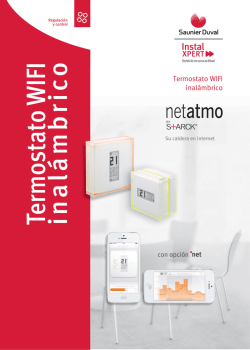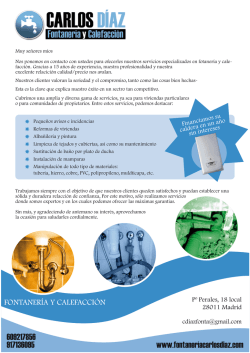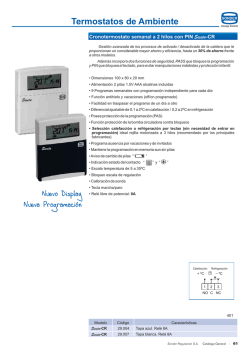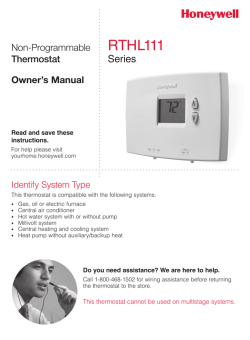
Non-Programmable Thermostats BT11NP BT21NP
BT11NP Model number is located on thermostat sub-base. Single Stage Heat Cool Conventional and Heat Pump BT21NP Up to 2 Heat / 1 Cool Convencional and Heat Pump Non-Programmable Thermostats 1 Specifications 4 Operating Your Thermostat 2 Installation 5 Additional Operation Features 3 Setting User Options 6 Thermostat Maintenance Warning Turn off power to the heating or cooling equipment before installation. Attention For installation by experienced service technicians only. Follow applicable codes. Read all instructions before proceeding. This thermostat requires 24 Volt AC Power or two (2) properly installed “AA” Alkaline batteries for proper operation. When connecting 24 Volt AC Power the batteries may be installed as a backup. For use only as described in this manual. Any other use will void warranty. 1 Specifications This thermostat is compatible with: • Single stage heat / cool conventional and heat pump systems • Conventional systems up to 2 heat / 1 cool (BT21NP only) • Single compressor heat pump systems with an auxiliary heat stage (BT21NP only) • 250 – 750 millivolt heat only systems Electrical and control specifications: • Electrical Rating: 24 Volt AC • 1 amp maximum load per terminal • AC Power: 18 – 30 Volts AC • DC Power: 3.0 Volt DC (2 “AA” Alkaline Batteries Included) • Control Range: 45° – 90° F (7° – 32° C) • Temperature Accuracy: +/- 1° F (+/- .5° C) Terminations • BT11NP – Rc, Rh, O, B, Y, W, G, C • BT21NP – R, O, B, Y1, E/W1, G, W2, C BTNP-100-03 2 Installation Warning Disconnect power before beginning installation. Thermostat Location Install the thermostat approximately 4-5 feet (1.2 - 1.5m) above the floor in an area that has a good amount of air circulation and maintains an average room temperature. Avoid installation in locations where the thermostat can be affected by drafts, dead air spots, hot or cold air ducts, sunlight, appliances, concealed pipes, chimneys and outside walls. Install your new BesTech thermostat in 5 basic steps: 1 2 3 4 5 Install the Sub-Base Provide Power Connect Your Wires Set Installer Switches Attach Thermostat to Sub-Base 1 Install the Sub-Base: • Remove the sub-base from the body of the thermostat. • Mount the sub-base as shown below: Drill 3/16” pilot holes in your desired location. Use supplied anchors for drywall or plaster. 2 Provide Power • For 24 Volt AC power, you must connect the common side of the trans- former to the C terminal on the thermostat sub-base. • For primary or back-up power, insert the 2 supplied “AA” type alkaline batteries into the battery compartment located on the front of the ther- mostat near the bottom. Make sure to position the Positive (+) and Negative (-) sides of the batteries correctly with the +/- symbols in the battery compartment. 1 3 Connect Your Wires Conventional Systems Typical Wiring Configurations NOTE: The “Installer Switch” option will be configured in the next step. Heat Only or Millivolt Set Installer Switch to NORM Rh* W G C 1 HEAT / 1 COOL Single or Dual Transformer Power Connection Heat Relay (appears as W1/E on BT21NP) Fan Relay [note 4] 24 Volt AC Transformer Common [note 1] Set Installer Switch to NORM Rh* Rc* W Y G C 2 HEAT / 1 COOL Single Transformer (BT21NP Only) Set System Type to NORM R W1 W2 Y1 G C 24 Volt AC Power (heating transformer) [note 2] 24 Volt AC Power (cooling transformer) [note 2] Heat Relay (appears as W1/E on BT21NP) Compressor Relay (appears as Y1 on BT21NP) Fan Relay 24 Volt AC Transformer Common [note 1, 3] 24 Volt AC Power Heat Relay Stage 1 Heat Relay Stage 2 Compressor Relay Stage 1 Fan Relay 24 Volt AC Transformer Common [note 1] NOTES - Conventional Systems [1]If batteries are installed the 24 Volt AC common connection is optional [2]Remove factory installed jumper for dual transformer systems [3]In dual transformer systems, transformer common must come from cooling transformer [4]If needed for system Provide disconnect and overload protection as required. *Appears as R on BT21NP (single transformer) 2 Heat Pump Systems Typical Wiring Configurations NOTE: The “Installer Switch” option will be configured in the next step. 1 HEAT / 1 COOL - No Auxiliary Heat Set Installer Switch to HP Rh* 24 Volt AC Power Rc* Connected to Rh with supplied Jumper Wire O or B Changeover Valve [note 2] Y1 Compressor Relay (appears as Y1 on BT21NP) G Fan Relay C 24 Volt AC Transformer Common [note 1] 2 HEAT / 1 COOL - Including Auxiliary Heat (BT21NP only) Set Installer Switch to HP R 24 Volt AC Power O or B Changeover Valve [note 2] Y1 Compressor Relay (1st stage heating/cooling) W2 Auxiliary Heat Relay (2nd stage heating) [note 3] W1/E Emergency Heat Relay [note 3] G Fan Relay C 24 Volt AC Transformer Common [note 1] NOTES - Heat Pump Systems [1]If batteries are installed the 24 Volt AC common connection is optional. [2]Select O for cool active or B for heat active. [3]Install a field supplied jumper between the W2 and E terminals if there is no separate emergency heat relay installed. Provide disconnect and overload protection as required. *Appears as R on BT21NP (single transformer) 4 Set Installer Switches Switch Factory Setting Default Options Comments NORM / HP NORM NORM HP Select for conventional systems Select for heat pump systems F / C F F C Select for fahrenheit temperature scale Select for celsius temperature scale HE / HG HG HG HE Select for gas heat Select for electric heat NOTE: The reset button should be pressed after making any changes to the installer switches. 3 5 Attach Thermostat to Sub-Base 1. Line up the thermostat body with the sub-base. 2. Carefully push the thermostat body against the sub-base until it snaps into place. NOTE: The thermostat hinges from the top and latches at the bottom. 3 Setting User Options Advanced User Options User options allow you to customize some of your thermostats features. Most users will not need to make any changes to the settings in this section. To access the User Options menu, hold down both the and buttons for approximately 3 seconds until the screen changes and displays the first User Option. Press the or button to change the setting for the displayed User Option. After you have made your desired setting, press and together to advance to the next User Option. The thermostat will return to normal mode after your last user option is made or after no keys have been pressed for 5 seconds. Table of User Options No. User Options 1 1st stage differential 2 2nd stage differential Factory Setting Default Options 0.5 2.0 (BT21NP Only) 0.5, 1.0 or 2.0 Comments Select a 1st stage temperature differential of 0.5˚, 1.0˚ or 2.0˚F (0.2˚, 0.5˚ or 1.0˚C) 1.0, 2.0, Select a 2nd stage temperature 3.0, 4.0, differential of 2˚, 3˚, 4˚, 5˚ or 6˚F 5.0 or 6.0 (1.0˚, 1.5˚, 2.0˚, 2.5˚ or 3.0˚C) Detailed Explanation of User Options: Temperature Differential (User Option 1 and 2) The differential setting is the temperature control range that your thermostat will provide. The smaller the setting, the tighter your range of temperature control and comfort will be. The 2nd stage differential is only for systems with a second stage of heating (auxiliary heat). 4 4 Operating Your Thermostat Setting the System Control Mode The System Control has several modes of operation that can be selected by moving the SYSTEM switch to one of three positions. COOL Only your cooling system will operate OFF Heating and cooling systems are off. HEAT Only your heating system will operate. Additional Switch Position (Model BT21NP Only): EMER Operates a backup heat source (Emergency Heat) for heat pump systems only. NOTE: If your model BT21NP was set to a conventional system (NORM) then you will not have the EMER (emergency heat) option and “NO AUX SET” will flash in the display if EMER is selected with the system switch. Setting the Fan Control Mode The Fan Control has 2 modes of operation – AUTO and ON. The mode can be selected by moving the FAN switch to the appropriate position. AUTO The system fan will run only when your heating or cooling system is running. ON The system fan will stay on. Temperature Adjustment Press the or button to adjust the current set point temperature. Status Indicators Status indicators appear in the display to let you know if your system is heating, cooling or off. HEAT If flashing, indicates your heating system is running. COOL If flashing, indicates your cooling system is running. Additional Status Indicators (Model BT21NP Only): AUX Indicates that the auxiliary stage of heating is running (Multi-Stage Systems only), or that the emergency heat system is running (heat pump systems only). Resetting the Thermostat This thermostat provides you with a reset button that will erase all of your user settings. To reset the thermostat, use a small object such as a tooth pick or paperclip and gently press the button located inside the small hole on the front of the thermostat housing labeled “reset”. 5 5 Additional Operation Features Compressor Protection This thermostat includes an automatic compressor protection delay to avoid potential damage to your system from short cycling. This feature activates a short delay after turning off the system compressor. 6 Thermostat Maintenance Changing the Batteries Depending on your particular installation, this thermostat may be equipped with two (2) “AA” type alkaline batteries. If batteries are installed and they become low, a low battery indicator will appear in the display. You should change your batteries immediately when you see the low battery signal by following these instructions. 1. Open the battery door located on the bottom of the thermostat. 2. Remove old batteries and replace with new batteries. 3. Make sure to correctly position the (+) and (-) symbols. 4. Close the battery door. NOTE: We recommend replacing the thermostat batteries annually or if the thermostat will be unattended for an extended period of time. Thermostat Cleaning Never spray any liquid directly on the thermostat. Using a soft damp cloth wipe the outer body of the thermostat. Never use any abrasive cleansers to clean your thermostat. Store this manual for future reference. 2 Year Limited Warranty Baker Distributing warrants each new BesTech thermostat against any defects that are due to faulty material or workmanship. This warranty and our liability does not apply to batteries, nor does it include damage to merchandise or the thermostat resulting from accident, alteration, neglect, misuse, improper installation or any other failure to follow BesTech installation and operating instructions. This limited warranty applies for the duration of the warranty period from the original date of purchase by a professional service technician. Baker Distributing agrees to repair or replace at its option any BesTech thermostat under warranty provided it is returned postage prepaid to our warranty facility in a padded carton within the warranty period, with proof of the original date of purchase and a brief description of the malfunction. This limited warranty does not include the cost of removal or re-installation. This warranty gives you specific legal rights and you may also have other rights that vary from state to state or province to province. Answers to any questions regarding our limited warranty may be obtained by writing our corporate offices. For warranty service, please visit your nearest Baker Distribution facility. Call us toll-free: 866-268-5599 (U.S.) • 630-844-1968 (Outside the U.S.) ©2012 BesTech • All Rights Reserved • www.bestechparts.com • Made in China. BTNP-100-03 BT11NP Numero de modelo está situado en la sub-base. Calefacción / aire acondicionado de una sola etapa Convencional y con bomba de calor BT21NP Multietapa, 2 de calefacción / 1 de aire acondicionado Convencional y con bomba de calor Termostatos no programables 1 Especificaciones 2 Instalación 3 Configuración de las opciones del usuario 4 Funcionamiento de su termostato 5 Características funcionales adicionales 6 Mantenimiento del termostato Advertencia Apague la energía que alimenta el equipo de aire acondicionado o calefacción antes de la instalación. Atención Solamente debe ser instalado por técnicos de servicio experimentados. Siga los codigos requeridos. Lea todas las instrucciones antes de continuar. Este termostato requiere energía de 24 V de CA o dos (2) baterías alcalinas tipo “AA” instaladas correctamente para su adecuado funcionamiento. Al conectar la energía a 24 V de CA, las baterías se pueden instalar como respaldo. Solamente se debe usar como se describe en este manual. Cualquier otro uso anulará la garantía. 1 Especificaciones Este termostato es compatible con: •Sistemas convencionales de calefacción / aire acondicionado y bomba de calor de una sola etapa. Sistemas convencionales de hasta 2 etapas de calefacción / 1 aire acondicionado (BT21NP solamente). •Sistemas de bomba de calor de compresor único con una etapa de calefacción auxiliar (BT21NP solamente). •Sistemas milivoltios de calefacción solamente de 250 mv a 750 mv Especificaciones eléctricas y de control: •Régimen de electricidad: 24 voltios CA •Carga máxima de 1 amperio por terminal •Energía CA: 18 – 30 voltios de AC •Energía CC: 3,0 voltios CC (2 baterías alcalinas tipo AA incluidas) •Amplitud de control: 7º – 32º C (45 ° – 90 °F) •Precisión de la temperatura: +/- 0.5° C (+/- 1° F) Terminaciones: •BT11NP – Rc, Rh, O, B, Y, W, G, C •BT21NP – R, O, B, Y1, E/W1, G, W2, C BTNP-100-03 2 Instalación Advertencia Desconecte la energía antes de empezar a hacer la instalación. Ubicación del termostato Instale el termostato aproximadamente a 1.2 - 1.5 m (4-5 pies) por encima del piso en un área que tenga una buena cantidad de aire circulante y mantenga una temperatura ambiental promedio. Evite la instalación en lugares donde el termostato pueda ser afectado por corrientes de aire, aire estancado, ductos de aire frío o caliente, luz solar, electrodomésticos, tuberías ocultas, chimeneas y paredes exteriores. Instale su nuevo termostato BesTech en 5 pasos básicos: 1 2 3 4 5 Instale la sub-base Suministre energía Conecte los cables Configure los interruptores de instalación Fije el termostato a la sub-base 1 Instale la sub-base: • Retire la sub-base del cuerpo del termostato. • Monte la sub-base como se muestra a continuación: Perfore agujeros guía de 4.8 mm (3/16 pulg.) en el lugar deseado. Use los anclajes suministrados para láminas de yeso o masilla. 2 Suministre energía • Para energía a 24 voltios de CA, debe conectar el lado común del transformador al terminal C de la sub-base del termostato. • Para energía primaria o secundaria, poner las 2 baterías “AA” suministradas en el compartimiento par alas baterías situado en la parte frontal baja del termostato. Asegúrese de colocar correctamente los lados positivo (+) y negativo (-) con los signos +/- del compartimiento de las baterías. 1 3 Conecte los cables Sistemas convencionales Configuraciones típicas de cableado NOTA: La opción “Interruptor de instalación” se configurará en el siguiente paso. Calefacción solamente o milivoltaje Configurar el interruptor de instalación en NORM Rh* W G C Transformador doble o sencillo con 1 etapa de calefacción / 1 etapa de aire acondicionado Conexión de la energía Relé de calefacción (aparece como W1/E en el modelo BT21NP) Relé del ventilador [nota 4] Línea común del transformador a 24 voltios de CA [nota 1] Configurar el interruptor de instalación en NORM Rh* Rc* W Y G C Transformador sencillo con 2 etapas de calefacción / 1 etapas de aire acondicionado (BT21NP solamente) Configure el tipo de sistema a NORM R W1 W2 Y1 G C Energía a 24 voltios de CA (transformador de calefacción) [nota 2] Energía a 24 voltios de CA (transformador de aire acondicionado) [nota 2] Relé de calefacción (aparece como W1/E en el modelo BT21NP) Relé del compresor (aparece como Y1 en el modelo BT21NP) Relé del ventilador Línea común del transformador a 24 voltios de CA [nota 1, 3] Energía a 24 voltios de CA Relé de calefacción etapa 1 Relé de calefacción etapa 2 Relé del compresor etapa 1 Relé del ventilador Línea común del transformador a 24 voltios de CA [nota 1] NOTAS - Sistemas convencionales [1]Si las baterías están instaladas, la conexión común a 24 voltios de CA es opcional. [2]Retire el puente instalado en fábrica para los sistemas de doble transformador. [3]En sistemas de doble transformador, la línea común del transformador debe venir del transformador de aire acondicionado. [4] Si es necessario para sistema. Proporcione protección contra desconexión y sobrecarga según sea necesario. * Aparece como R en el BT21NP (un transformador) 2 Sistemas de bomba de calor Configuraciones típicas de cableado NOTA: La opción “Interruptor de instalación” se configurará en el siguiente paso. 1 etapa de calefacción / 1 etapa de aire acondicionado – Sin calefacción auxiliar Configure el interruptor de instalación en HP Rh* Rc* OoB Y1 G C Energía a 24 voltios de CA Conectado a Rh con el cable para puente suministrado Válvula de conversión [nota 2] Relé del compresor (aparece como Y1 en el modelo BT21NP) Relé del ventilador Línea común del transformador a 24 voltios de CA [nota 1] 2 etapas de calefacción / 1 etapa de aire acondicionado – Incluida calefacción auxiliar (BT21NP solamente) Configure el interruptor de instalación en HP R Energía a 24 voltios de CA O o B Válvula de conversión [nota 2] Y1 Relé del compresor (1ra etapa de calefacción/aire acondicionado) W2 Relé de calefacción auxiliar (2da etapa de calefacción) [nota 3] W1/E Relé de calefacción de emergencia [nota 3] G Relé del ventilador C Línea común del transformador a 24 voltios de CA [nota 1] NOTAS - Sistemas de bomba de calor [1]Si las baterías están instaladas, la conexión común a 24 voltios de CA es opcional. [2]Seleccione O para aire acondicionado activo o B para calefacción activa. [3]Instale un puente suministrado en obra entre los terminales W2 y E si no se ha instalado un relé de calefacción de emergencia por separado. Proporcione protección contra desconexión y sobrecarga según sea necesario. * Aparece como R en el BT21NP (un transformador). 4 Configure los interruptores de instalación Valor predeter- Opciones de Interruptor minado de fábrica configuración Comentarios NORM / HP NORM F / C F HE / HG HG NORM HP Seleccione para el sistema convencional Seleccione para el sistema de bomba de calor F Seleccione para escala de temperatura de grados Fahrenheit C Seleccione para escala de tempera- tura de grados centígrados HG HE Seleccione para calefacción a gas Seleccione para calefacción eléctrica NOTA: Después de haber realizado cualquier cambio en los interruptores, presione el botón reiniciar. 3 5 Fije el termostato a la sub-base 1. Alinee el cuerpo del termostato con la sub-base. 2. Empuje cuidadosamente el cuerpo del termostato contra la sub-base hasta que encaje en su sitio. NOTA: El termostato se conecta por la parte superior y encaja en la parte inferior. 3 Configuración de las opciones del usuario Opciones avanzadas del usuario Las opciones del usuario permiten personalizar algunas de las características de su termostato. La mayoría de los usuarios no tendrán que hacer ningún cambio a lo programado en esta sección. Para tener acceso al menú Opciones del usuario, mantenga presionados los botones y durante 3 segundos aproximadamente hasta que la pantalla cambie y muestre la primera Opción para el usuario. Presione el botón o para cambiar la configuración para la Opción del usuario que se muestra. Después de haber realizado la configuración deseada, presione al mismo tiempo y para avanzar a la siguiente opción del usuario. El termostato regresará al modo normal después de la última opción del usuario o si no se presiona una tecla durante 5 segundos. Tabla de las opciones del usuario Opciones No. del usuario Valor pre- determinado Opciones de de fábrica configuración Comentarios 1 Diferencial de 0.5 0.5, 1.0 1ra etapa or 2.0 2 Diferencial de 2.0 1.0, 2.0, 2da etapa 3.0, 4.0, (BT21NP 5.0 or 6.0 solamente) Seleccione un diferencial de temperatura de 1ra etapa de 0.2˚, 0.5˚ o 1.0˚C (0.5˚, 1.0˚ o 2.0˚F). Seleccione un diferencial de temperatura de 2da etapa de 1.0˚, 1.5˚, 2.0˚, 2.5˚ o 3.0˚C (2˚, 3˚ 4˚, 5˚ o 6˚F). Explicación detallada de las opciones del usuario: Diferencial de temperatura (Opción del usuario 1 y 2) La configuración diferencial es la amplitud de control de temperatura que el termostato le proporcionará. A menor configuración, menor será la amplitud de control de temperatura y la comodidad. El diferencial de 2da etapa está destinado solamente a sistemas con segunda etapa de calefacción (calefacción auxiliar). 4 4 Funcionamiento de su termostato Configuración del modo de control del sistema El Control de Sistema tiene varios modos de operación que pueden ser seleccionados al mover el switch SYSTEM a una de tres posiciones. COOL (Aire acondicionado) Sólo funcionará el sistema de aire acondicionado. OFF (Apagado) Los sistemas de calefacción y de aire acondicionado están apagados. HEAT (Calefacción) Sólo funcionará el sistema de calefacción. Posición de interruptor adicional (para modelo BT21NP solamente) EMER (Emergencia) Opera una fuente de calefacción de respaldo (calefacción de emergencia) sólo para los sistemas de bomba de calor. NOTA: Si su modelo BT21NP fue programado para un sistema convencional (NORM) no tendrá la opción EMER (calefacción de emergencia) y “NO AUX SET” destellara en la pantalla si EMER es seleccionado en el switch del sistema. Configuración del modo de control del ventilador El control del ventilador tiene 2 modos de funcionamiento - AUTO (Automático) y ON (Encendido). Puede seleccionar el modo moviendo el interruptor de FAN (ventilador) a la posición adecuada. AUTO (Automático) El ventilador del sistema funcionará sólo cuando su sistema de calefacción o aire acondicionado esté funcionando. ON (Encendido) El ventilador del sistema funcionará continuamente. Ajuste de la temperatura Presione el botón o para ajustar el valor predeterminado actual de la temperatura. Indicadores de estado Los indicadores del estado aparecen en la pantalla para informarle si su sistema está en calefacción, aire acondicionado o apagado. HEAT (Calefacción) Si esta destellando indica que la calefacción esta activada. COOL (Aire Acondicionado) Si esta destellando indica que el aire acondicionado esta activado. Indicadores de estado adicionales (Modelo BT21NP solamente): AUX Indica que la etapa auxiliar de calefacción esta activada (solo en sistemas multi-etapa) o que el sistema de calefacción de emergencia esta activado (solo en sistemas de bomba de calor). 5 Reinicio del termostato Este termostato tiene un botón de reinicio (Reset) que borrara toda la programación del usuario. Para reiniciar el termostato, utilice un objeto pequeño, como un palillo o un clip y presione suavemente el botón ubicado dentro del pequeño agujero de la parte frontal de la caja del termostato rotulado “reset” (reiniciar). 5 Características funcionales adicionales Protección del compresor Este termostato incluye un retardo de protección automática del compresor para evitar posibles daños al sistema provocados por ciclos cortos. Esta característica activa un corto retardo después de apagar el compresor del sistema. 6 Mantenimiento del termostato Cambio de las baterías Dependiendo del tipo de instalación, este termostato puede estar equipado con dos (2) baterías alcalinas de tipo “AA”. Si las baterías están instaladas y la carga baja, aparecerá en la pantalla un indicador de batería baja. Debe cambiar las baterías inmediatamente cuando vea la señal de batería baja, siguiendo estas instrucciones. 1. Abra la puerta de las baterías que está en la parte inferior del termostato. 2. Retire las baterías viejas y reemplácelas por unas nuevas. 3. Asegúrese de colocar correctamente los signos (+) y (-). 4. Cierre la puerta de las baterías. NOTA: Recomendamos reemplazar las baterías del termostato anualmente o si el termostato quedará desatendido por un período largo de tiempo. Limpieza del termostato No rocíe ningún líquido directamente sobre el termostato. Limpie la parte de exterior del termostato con un paño suave y húmedo. Nunca utilice limpiadores abrasivos para limpiar el termostato. Guarde este manual para consultarlo en el futuro. 2 Años de Garantía Limitada Baker Distributing garantiza a cada nuevo termostato BesTech contra defectos causados por material o fabricación defectuosa. Esta garantía y nuestra responsabilidad no es aplicable a las baterías, ni incluye daños a la mercancía o termostato como resultado de un accidente, alteración, negligencia, mal uso, instalación malhecha o cualquier otra falla en seguir las instrucciones de instalación u operación de BesTech. Esta garantía limitada es aplicable desde la fecha de compra original por un técnico profesional. Baker Distributing acepta reparar o reemplazar a su elección cualquier termostato BesTech que se encuentre bajo garantía, siempre y cuando se devuelva, con gastos de correo pagados, a nuestro centro de garantías en una caja de cartón acolchada, dentro del período de la garantía, con un comprobante de la fecha original de compra y una breve descripción del defecto. Esta garantía limitada no incluye el costo de retiro o reinstalación. Esta garantía le da derechos legales específicos y usted puede tener también otros derechos que varían de un estado a otro o de una provincia a otra. La respuesta a cualquier pregunta acerca de nuestra garantía limitada se puede obtener escribiendo a nuestras oficinas corporativas. Para garantia contacte a Baker Distribution. Teléfono: 630.844.1968 ©2012 BesTech • Todos los derechos están reservados. www.bestechparts.com • Hecho en China. BTNP-100-03
© Copyright 2026




